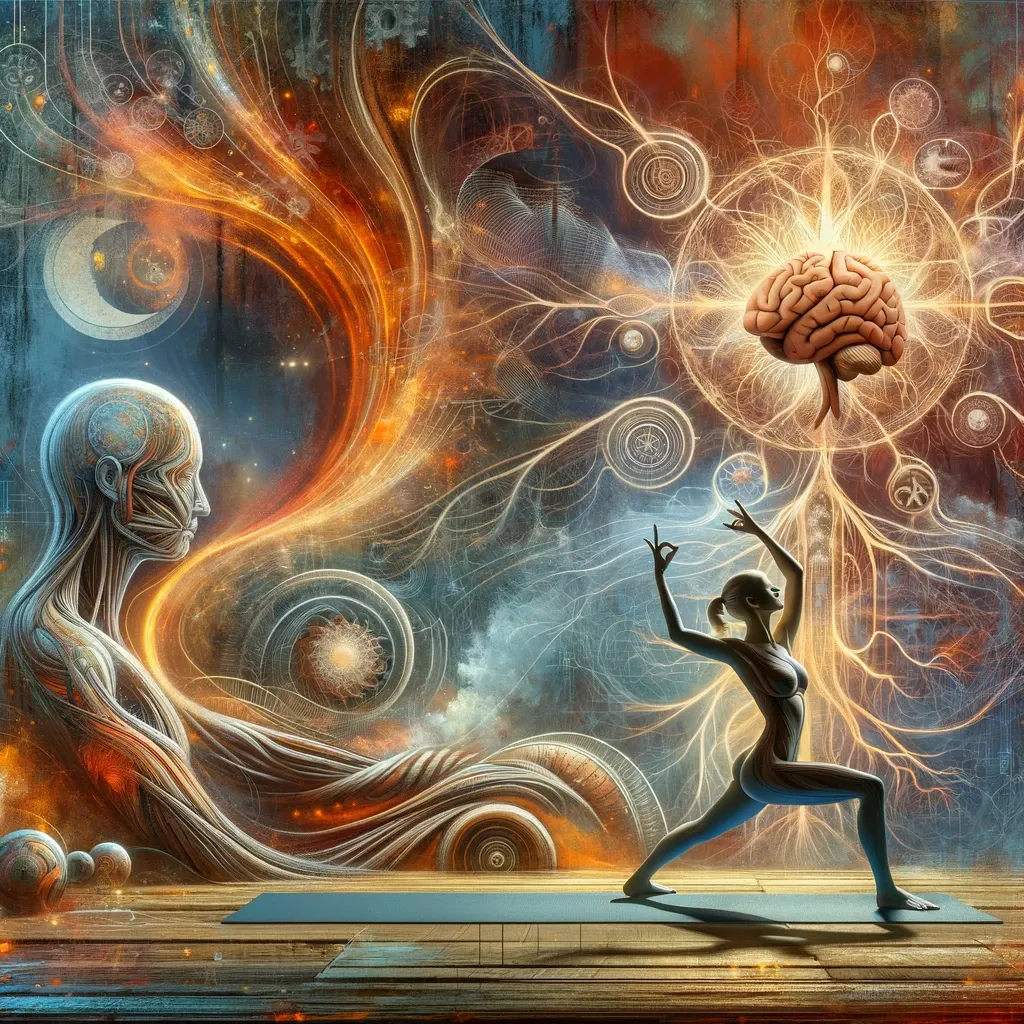Discovering Serenity: Harnessing the Power of Yoga for Anxiety Reduction

Anxiety disorders can leave you feeling trapped, but don't fret - yoga is here to guide you back to peace. Discover how yoga poses, breathing techniques, and mindfulness practices can equip you with tools for anxiety management.
The Magnitude of Yoga in Battling Anxiety Disorders

We all yearn for peace amidst the chaos of our fast-paced lives. If you're battling generalized anxiety disorder or other anxiety disorders, let me introduce you to a powerful tool – yoga. This ancient practice isn’t just about physical postures; it's a journey towards harmony, aligning the body, mind, and spirit.
Here are some profound ways how yoga can lead us to tranquility:
- Yoga Reduces Anxiety Symptoms: Practicing relaxing yoga poses daily calms the mind and keeps it in balance.
- It Triggers The Parasympathetic Nervous System: This system is responsible for relaxation and calmness.
- Yoga Enhances Mental Health: Regular yoga practice has been shown to lessen symptoms of anxiety disorders.
Unraveling The Efficacy of Yoga In Alleviating Anxiety Disorders

As a seasoned yoga teacher, I've witnessed how consistent practice of hatha yoga significantly mitigates symptoms associated with generalized anxiety disorder. It's more than stretching; it's about mental resilience.
Yoga offers unique methods to combat panic attacks and severe anxiety. Incorporating calming yoga postures not only provides immediate relief but also fortifies your mind against future stressors. Furthermore, coupling these poses with deep-breathing exercises amplifies their efficacy in treating anxiety.
Join us on this path as we explore how one breath at a time can instill peace into our turbulent lives!
Examining Mindfulness Practices in Yoga for Anxiety Reduction
Mindfulness, or the practice of being in the present moment, lies at the heart of yoga. As a yoga teacher, I emphasize how breath is the bridge between our physical and mental well-being.
The benefits of mindfulness are manifold. It fosters a sense of calm, infuses inner peace, and reconnects us with our true selves. Mindfulness can be cultivated in yoga through focused breathing, non-judgmental observation, and deliberate movements.
Incorporating mindfulness practices into your yoga practice can revolutionize your life by alleviating chronic nervousness and promoting overall mental health.
The Science Behind Yoga's Impact on The Nervous System

Yoga has profound effects on our nervous system by modulating our stress response. Studies show that regular yoga practice attenuates the fight-or-flight response, enabling us to react thoughtfully rather than impulsively.
Calming yoga poses stimulate the vagus nerve - responsible for inducing a sense of safety and tranquility within us. This helps our bodies relax and release tension, improves blood flow, and reduces blood pressure.
By activating our parasympathetic nervous system during relaxation exercises such as Savasana (Corpse Pose) or Child's Pose, we can lower cortisol levels - our primary stress hormone - leading to reduced anxiety symptoms.
Making Yoga a Lifestyle for Treating Anxiety Disorders
Adopting yoga as a lifestyle rather than a mere exercise routine can work wonders in managing severe anxiety. Engaging in even a few minutes of daily practice can make an impactful difference!
Our supportive yoga community fosters belongingness while empowering each member with tools for stress management like mindfulness practices and breathing techniques. This holistic approach transcends beyond just physical exercise; it promotes harmony while mitigating anxiety off-the-mat as well!
Implementing Yoga Poses Daily for Calmness

Incorporating yoga poses into your daily routine can provide a profound sense of calm and reduce anxiety. Regular practice enhances peace in our lives while also fostering a deeper sense of self-awareness.
Yoga isn't a quick fix; it's a journey. Join us on this voyage as we discover how yoga can dramatically transform our everyday lives into an oasis of serenity.
Conclusion
As we wrap up this insightful exploration, take a moment to inhale and exhale deeply. Remember, every breath you take, every pose you strike brings you closer to inner peace. So unroll your mat and let’s embark on this tranquil journey together!
Don’t forget: Yoga is not just about mastering the poses; it's about using the poses to master yourself.
Frequently Asked Questions
Q1: Can yoga help reduce anxiety symptoms?
A: Absolutely! Yoga can be a valuable tool in managing anxiety symptoms. The combination of physical postures, breathing exercises, and mindfulness practices that yoga offers can significantly alleviate symptoms of anxiety and stress.
Q2: I'm a beginner with no flexibility. Can I still practice yoga?
A: Of course! Yoga is for everyone, regardless of age or flexibility level. It's not about touching your toes; it's about what you learn on your way down. Start where you are, use what you have, and do what you can.
Q3: How does yoga affect the nervous system?
A: Regular yoga practice stimulates the parasympathetic nervous system – the rest-and-digest part of our nervous system. This activation helps reduce stress response and induces a sense of calmness and relaxation.
Q4: What types of yoga are best for anxiety reduction?
A: Gentle forms of yoga like Hatha Yoga, Yin Yoga, or Restorative Yoga are often recommended for anxiety reduction due to their calming nature. However, any type of yoga that makes you feel relaxed and at peace is beneficial.
Q5: How frequently should I practice yoga to see improvements in my anxiety levels?
A: While there's no hard-and-fast rule, studies suggest practicing 3-5 times per week can yield noticeable benefits in reducing anxiety disorders. Even just 15 minutes per day can make a significant difference over time.
Q6: Can I practice yoga at home?
A: Yes! You don't need a fancy studio to reap the benefits of yoga. With a mat and enough space to stretch out comfortably, you can practice various poses at home using online resources or guided classes.
Q7: Are there specific poses recommended for stress relief?
A: Yes, poses such as Child's Pose, Corpse Pose, and the Extended Puppy Pose are known to promote relaxation and stress relief. However, it's important to listen to your body and find what works best for you.
Q8: How does mindfulness practice fit into yoga for anxiety?
A: Mindfulness is central to yoga practice. It involves paying attention to the present moment without judgment, which helps you disconnect from worries and anxieties, promoting a sense of peace and relaxation.
Q9: Is yoga a substitute for medication or therapy in treating anxiety disorders?
A: While yoga can significantly alleviate symptoms of anxiety, it should not replace medical treatments without consulting your healthcare provider. Yoga can be an effective complement to traditional treatment methods for anxiety disorders.

